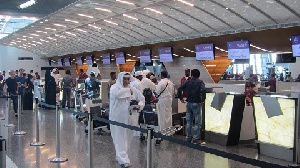 A photo of tourists arriving in the country
A photo of tourists arriving in the country
The Indian Ocean nation of the Seychelles recently re-imposed coronavirus restrictions after a sharp spike in cases as it continues to juggle the pandemic with its reliance on tourism.
More than 60% of the island archipelago's 100,000 residents have now had two doses of a coronavirus vaccine.
But the recent spike is a reminder that vaccination is no magic bullet.
The tourism industry contributes more than a quarter of the country's GDP, according to the African Development Bank.
But after visitors started arriving back at the end of March this year with no vaccination required, virus cases started to rise.
The seven-day rolling average of daily new infections in the Seychelles rose over the past two weeks from 148.03 new cases per 100,000 people on May 4 to 231.27 on May 18, according to data collected by Johns Hopkins University.
Despite the high per capita case rates, health workers feel confident the country will be able to cope.
Restrictions re-imposed at the start of the month included the temporary shutting of schools and the earlier closure of shops, bars and casinos.
The Seychelles Public Health Commissioner said he believed the peak of the latest wave had passed and the vaccination rollout would continue to protect the population.
There have been no deaths so far amongst people who've received two shots of a vaccine, he said, with cases presenting as either asymptomatic or with mild symptoms.
The spike has been seen on all the three main islands, Mahe, Praslin and La Digue - but tourists with a negative coronavirus test are still welcome and "can move freely", according to officials.